Creation Care as Kingdom Action
Meditation
Too often we might think of “creation care” as something we can opt to do—something for people with a natural “green thumb,” a desire to garden, or an environmentalist impulse. We can easily forget that creation care is both a mandate from God and a form of kingdom action. By caring for the earth and its creatures, we fulfill our human vocation as described in Genesis 1 and 2 and we partner with Christ in his work of reconciling and liberating all things. For it is God’s desire that all of creation might experience the shalom for which it was made.
As it says in Psalm 24:1, “The earth is the Lord’s and all that is in it.” We are not owners of it. However, God has made us its caretakers. Genesis 1:28 tells us that we have been given “dominion” over the earth and all its inhabitants. Like stewards left to care for kingdom property, we are to “tend and keep it”—to work with it and care for it—until Christ returns (Gen. 2:15). This care-taking dominion is an integral part of what it means to be human, particularly for the Christian.
However, our concern for creation and our call to care for it is not simply rooted in the creation story and our human vocation; it is also an integral part of continuing Christ’s mission here on earth. As co-heirs with Christ and agents of his kingdom, we are called to be the presence of Christ on earth by proclaiming the kingdom and continuing Christ’s reconciling work. We often think of this mission in terms of ministry to human beings, but scripture reveals that the proclamation of the good news extends to all of creation. As Paul writes in Colossians 1:23, the gospel is to be “preached to every creature under heaven”—not simply human beings—for Christ came to reconcile all things (Col. 1:20).
This makes sense given that all of creation suffers from the pervasive effects of sin (Rom. 8:20–22). As we see in Romans 8, not only are human beings oppressed, but creation itself has been “subjected to futility” due to the fall (Rom. 8:20; cf. Gen. 3:17). It is God’s desire that creation be liberated from this “bondage to decay” so that it might experience the freedom that we, through the Spirit, enjoy now and will enjoy in its fullness when Christ returns (Rom. 8:21). As agents of the kingdom, we are to work toward this end. Just as we are called to care for, liberate, and reconcile human beings, so too are we called to the work of liberating the land and reconciling all of its inhabitants so that creation might experience freedom and flourishing.
That God intends for creation to flourish makes sense given the profound interdependence of created life. Without fertile soil or clean water, a healthy atmosphere or thriving plants and animals, human beings can’t survive, much less thrive. The flourishing of all of creation is the necessary prerequisite and context for human flourishing.
Yet God desires for creation to flourish not simply because it benefits and enables human life. As Genesis reminds us, God looked on everything he had made and called it good—not just human beings (Gen. 1:28–29). Because God created it, it has inherent worth and, as such, deserves our respect, care, and delight. Moreover, creation plays an integral role in glorifying God on earth (Ps. 19:1; 148) and will participate in the life of the eschatological kingdom (Rev. 22:2). Just as our bodies will not be destroyed but resurrected when Christ returns, so too will creation be restored, redeemed, and in some mysterious way “resurrected” when Christ reigns in the new heavens and the new earth.
Thus creation care is a call to reclaim our fundamental vocation as image bearers of God and good stewards of this earth, and to broaden our anthropocentric perspective in order to embrace God’s all-encompassing vision—a vision that sees all of creation and calls it good. It is to become an agent of the kingdom who sets about the work of liberating, reconciling, and restoring all of creation so that all things might glorify God and experience the shalom that characterizes life with him. As we do that work now, we enjoy the fruits of it, and in hope and anticipation we point toward Christ’s kingdom, which will one day surely come “on earth as it is in heaven.”
Exploration
How well do you know your local natural environment? What plant and animal species live within a five-mile radius of your home? There are several phone apps available to help you identify trees, flowers, and birdcalls. You might also visit a nearby nature center. Being a good neighbor to the nonhuman life you share an ecosystem with begins with learning their names!
Consider how your actions (e.g., consumption habits, transportation choices) contribute to the ecological crisis and prevent the full flourishing of God’s creatures and their habitats. What is one concrete action you can take to reduce this harm? One idea might be using less plastic (such as forgoing straws at restaurants or buying reusable grocery bags), using reusable napkins or rags instead of paper towels, or bicycling to work instead of driving. It may seem like the impact of such small choices is negligible in the grand scheme of things, but trust that God will honor your faithfulness as you long and labor for the renewal of creation.
The Rev. Abigail Hull Whitehouse is an Anglican priest, military spouse, and mother of two small children. When she isn’t doing the good work of mothering, she enjoys preaching, painting, and spending time in her garden.

